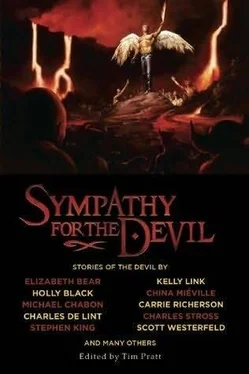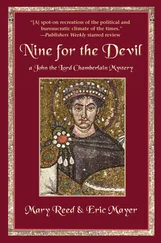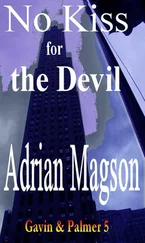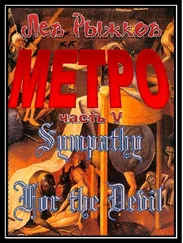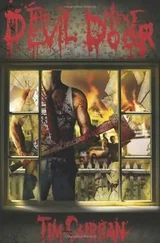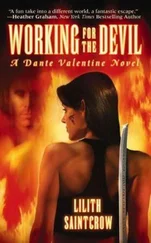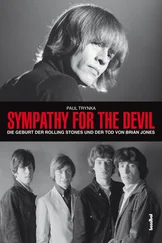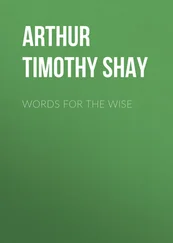This information ought to have struck a chord in my memory, of course, but it did not. I settled my hat on my head, bid Miss Brand good night, and walked slowly home, with the dictionary under my arm and, in my briefcase, von Junzt’s stout tome and the little black-leather volume filled with sinuous mysterious script.
I will not tax the reader with an account of my struggles with Köhler’s dictionary and the thorny bramble of von Junzt’s overheated German prose. Suffice to say that it took me the better part of the evening to make my way through the introduction. It was well past midnight by the time I arrived at the first chapter, and nearing two o’clock before I had amassed the information that I will now pass along to the reader, with no endorsement beyond the testimony of those pages, nor any hope of its being believed.
It was a blustery night; I sat in the study on the top floor of my old house’s round tower, listening to the windows rattle in their casements, as if a gang of intruders were seeking a way in. In this high room, in 1885, it was said, Howard Ash, the last living descendant of our town’s founder, General Hannaniah Ash, had sealed the blank note of his life and dispatched himself, with postage due, to his Creator. A fugitive draft blew from time to time across my desk and stirred the pages of the dictionary by my left hand. I felt, as I read, as if the whole world were asleep-benighted, ignorant, and dreaming-while I had been left to man the crow’s nest, standing lonely vigil in the teeth of a storm that was blowing in from a tropic of dread.
According to the scholar or charlatan Friedrich von Junzt, the regions around what is now northern Armenia had spawned, along with an entire cosmology, two competing cults of incalculable antiquity, which survived to the present day: that of Yê-Heh, the God of Dark Laughter, and that of Ai, the God of Unbearable and Ubiquitous Sorrow. The Yê-Hehists viewed the universe as a cosmic hoax, perpetrated by the father-god Yrrh for unknowable purposes: a place of calamity and cruel irony so overwhelming that the only possible response was a malevolent laughter like that, presumably, of Yrrh himself. The laughing followers of baboon-headed Yê-Heh created a sacred burlesque, mentioned by Pausanias and by one of the travellers in Plutarch’s dialogue “On the Passing of the Oracles,” to express their mockery of life, death, and all human aspirations. The rite involved the flaying of a human head, severed from the shoulders of one who had died in battle or in the course of some other supposedly exalted endeavor. The clown-priest would don the bloodless mask and then dance, making a public travesty of the noble dead. Through generations of inbreeding, the worshippers of Yê-Heh had evolved into a virtual subspecies of humanity, characterized by distended grins and skin as white as chalk. Von Junzt even claimed that the tradition of painted circus clowns derived from the clumsy imitation, by noninitiates, of these ancient kooks.
The “immemorial foes” of the baboon boys, as the reader may have surmised, were the followers of Ai, the God Who Mourns. These gloomy fanatics saw the world as no less horrifying and cruel than did their archenemies, but their response to the whole mess was a more or less permanent wailing. Over the long millennia since the heyday of ancient Urartu, the Aiites had developed a complicated physical discipline, a sort of jujitsu or calisthenics of murder, which they chiefly employed in a ruthless hunt of followers of Yê-Heh. For they believed that Yrrh, the Absent One, the Silent Devisor who, an eternity ago, tossed the cosmos over his shoulder like a sheet of fish wrap and wandered away leaving not a clue as to his intentions, would not return to explain the meaning of his inexplicable and tragic creation until the progeny of Yê-Heh, along with all copies of the Yê-Hehist sacred book, “Khndzut Dzul,” or “The Unfathomable Ruse,” had been expunged from the face of the earth. Only then would Yrrh return from his primeval hiatus-“bringing what new horror or redemption,” as the German intoned, “none can say.”
All this struck me as a gamier variety of the same loony, Zoroastrian plonk that my mother had spent her life decanting, and I might have been inclined to set the whole business aside and leave the case to be swept under the administrative rug by Jack Ganz had it not been for the words with which Herr von Junzt concluded the second chapter of his tedious work:
While the Yê-Hehis gospel of cynicism and ridicule has, quite obviously, spread around the world, the cult itself has largely died out, in part through the predation of foes and in part through chronic health problems brought about by inbreeding. Today [von Junzt’s book carried a date of 1849] it is reported that there may be fewer than 150 of the Yê-Hehists left in the world. They have survived, for the most part, by taking on work in travelling circuses. While their existence is known to ordinary members of the circus world, their secret has, by and large, been kept. And in the sideshows they have gone to ground, awaiting the tread outside the wagon, the shadow on the tent-flap, the cruel knife that will, in a mockery of their own long-abandoned ritual of mockery, deprive them of the lily-white flesh of their skulls.
Here I put down the book, my hands trembling from fatigue, and took up the other one, printed in an unknown tongue. “The Unfathomable Ruse ”? I hardly thought so; I was inclined to give as little credit as I reasonably could to Herr von Junzt’s account. More than likely the small black volume was some inspirational text in the mother tongue of the dead man, a translation of the Gospels perhaps. And yet I must confess there were a few tangential points in von Junzt’s account that caused me some misgiving.
There was a scrape then just outside my window, as if a finger with a very long nail were being drawn almost lovingly along the glass. But the finger turned out to be one of the branches of a fine old horse-chestnut tree that stood outside the tower, scratching at the window in the wind. I was relieved and humiliated. Time to go to bed, I said to myself. Before I turned in, I went to the shelf and moved to one side the bust of Galen that I had inherited from my father, a country doctor. I took a quick snort of good Tennessee whiskey, a taste for which I had also inherited from my old man. Thus emboldened, I went over to the desk and picked up the books. To be frank, I would have preferred to leave them there-I would have preferred to burn them, to be really frank-but I felt that it was my duty to keep them about me while they were under my watch. So I slept with the books beneath my pillow, in their wax envelopes, and I had the worst dream of my life.
It was one of those dreams where you are a fly on the wall, a phantom bystander, disembodied and unable to speak or intervene. In it, I was treated to the spectacle of a man whose young son was going to die. The man lived in a corner of the world where, from time to time, evil seemed to bubble up from the rusty red earth like a black combustible compound of ancient things long dead. And yet, year after year, this man met each new outburst of horror, true to his code, with nothing but law books, statutes, and county ordinances, as if sheltering with only a sheet of newspaper those he had sworn to protect, insisting that the steaming black geyser pouring down on them was nothing but a light spring rain. That vision started me laughing, but the cream of the jest came when, seized by a spasm of forgiveness toward his late, mad mother, the man decided not to prosecute one of her old paramours, a rummy by the name of Craven, for driving under the influence. Shortly thereafter, Craven steered his old Hudson Terraplane the wrong way down a one-way street, where it encountered, with appropriate cartoon sound effects, an oncoming bicycle ridden by the man’s heedless, darling, wildly pedalling son. That was the funniest thing of all, funnier than the amusing ironies of the man’s profession, than his furtive drinking and his wordless, solitary suppers, funnier even than his having been widowed by suicide: the joke of a father’s outliving his boy. It was so funny that, watching this ridiculous man in my dream, I could not catch my breath for laughing. I laughed so hard that my eyes popped from their sockets, and my smile stretched until it broke my aching jaw. I laughed until the husk of my head burst like a pod and fell away, and my skull and brains went floating off into the sky, white dandelion fluff, a cloud of fairy parasols.
Читать дальше
